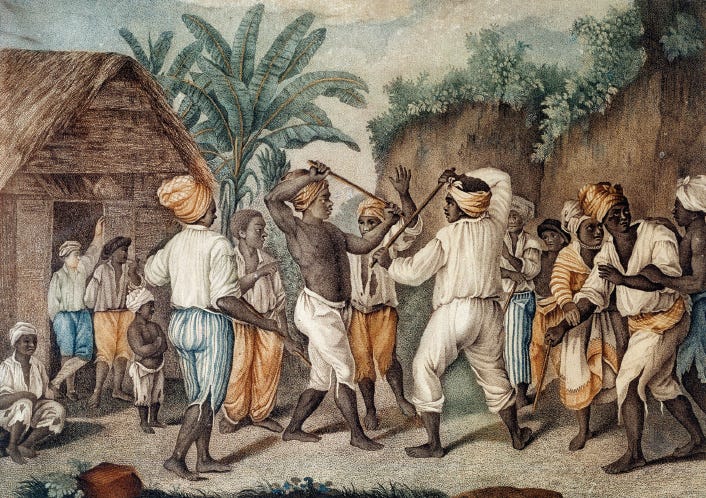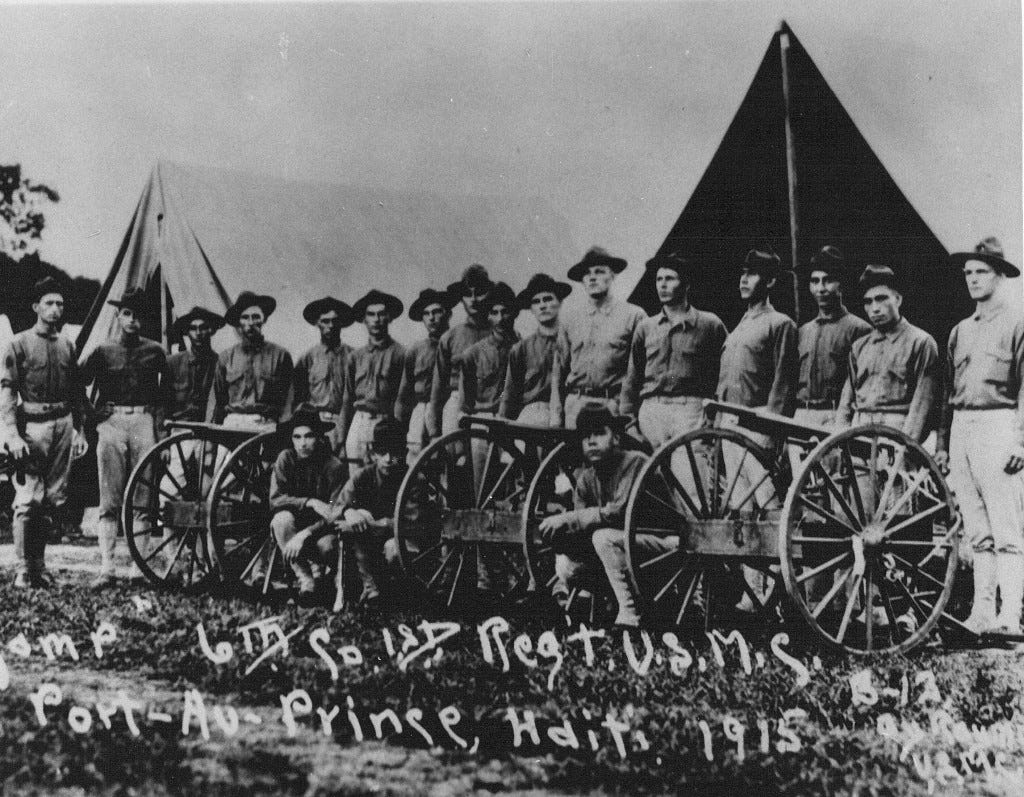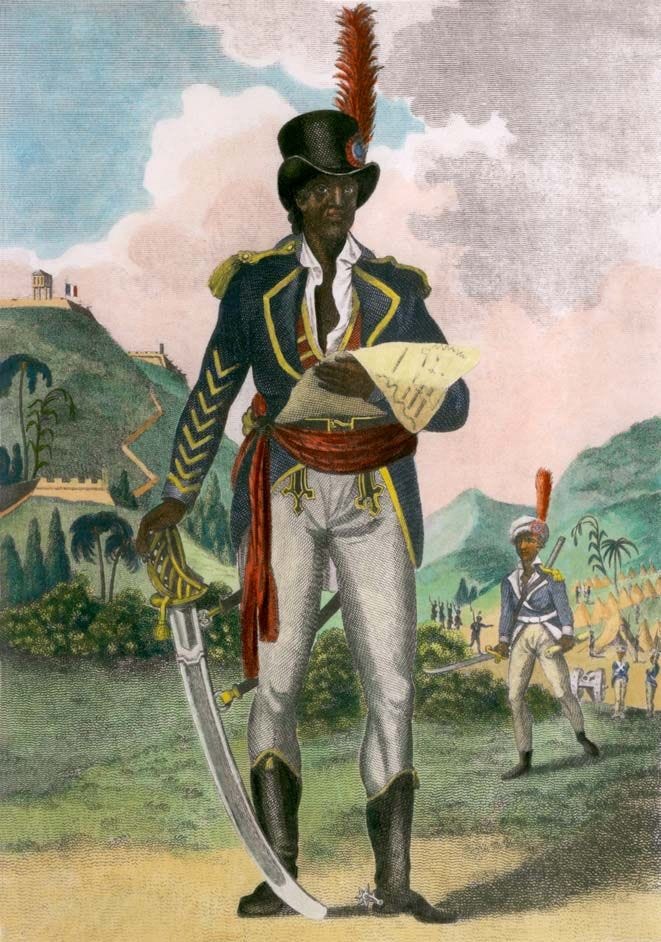Naomi Osaka Slams France Over Haiti's Stolen Billions: “Can Haiti Get Their Money Back?”
She’s exposing the 100-year debt that destroyed the world’s first Black republic.
This one sentence on X (formerly Twitter) might have been the most honest foreign policy suggestion of the year:
Naomi Osaka, a four-time Grand Slam tennis champion with Haitian heritage, was responding to a French politician who suggested the U.S. should return the Statue of Liberty. But Osaka wasn’t having it. Instead, she flipped the script — and reminded the world of one of the greatest historical injustices you probably didn’t learn in school: Haiti paying reparations.
Haiti’s Unforgivable Sin: Winning
To fully appreciate the gravity of Osaka’s intervention, one must return to the early nineteenth century, when Haiti, then known as Saint-Domingue, was the richest colony in the world. French planters extracted immense wealth from the island’s sugar and coffee plantations through the labor of enslaved Africans. By the late eighteenth century, Saint-Domingue supplied approximately 60 percent of the world’s coffee and 40 percent of the sugar consumed in Europe. This prosperity came at a staggering human cost. The colony was infamous for its brutality. Enslaved people were subjected to sadistic punishments, extraordinarily high mortality rates, and a life expectancy so low that planters often found it more profitable to work people to death and replace them than to allow them to survive.
In 1791, the enslaved population of Saint-Domingue rose up in what became the most successful slave revolt in history. Over the next thirteen years, Haitian revolutionaries — most famously Toussaint Louverture and Jean-Jacques Dessalines — fought off French, Spanish, and British forces. By 1804, they had declared independence and established Haiti as the first sovereign Black nation in the Americas. The Haitian Revolution was not merely a political rupture. It was a seismic moral and ideological challenge to the global order. In a world still dependent on racial slavery, Haiti’s existence was radical. As a result, from the moment of its birth, the new nation was isolated, demonized, and undermined by the very powers that preached liberty while profiting from bondage.
The Price of Freedom: A Colonial Ransom
If Haiti’s revolution represented the triumph of anti-colonial resistance, its aftermath revealed the enduring power of imperial greed. In 1825, more than two decades after Haitian independence, France returned to Haitian shores, not with diplomatic envoys but with a fleet of warships. The French king, Charles X, issued an ultimatum. Haiti would pay France 150 million francs in reparations for the “losses” incurred by former French colonists. These losses included not only land and capital but also the enslaved people whom Haiti had freed. If Haiti refused, France promised war. This was not a negotiation; it was coercion backed by the threat of re-enslavement and renewed colonization.
Faced with this impossible choice, Haitian President Jean-Pierre Boyer agreed to the terms. The result was a crippling debt, later reduced to 90 million francs, that Haiti would spend more than a century repaying. To make the first installment, Haiti had to borrow from French banks at exploitative interest rates, which initiated a cycle of dependency that drained the nation’s treasury and choked its development. According to estimates by The New York Times, Haiti paid at least $560 million in today’s dollars to former slaveholders and their descendants. When accounting for the compounded economic loss — the opportunity cost of investments never made in education, healthcare, or infrastructure — that figure may reach as high as $115 billion. All of this was extracted not in exchange for goods or services, but as punishment for a successful Black revolution.
Structural Underdevelopment by Design
The legacy of the independence debt was not merely financial. It fundamentally shaped the architecture of Haitian society, transforming what should have been a liberated and autonomous nation into one that was structurally dependent on foreign capital and geopolitically vulnerable to external manipulation. At a time when other nations were investing in public works, railroads, sanitation, and schools, Haiti was diverting a significant portion of its national revenue to enrich European banks and aristocrats. This economic strangulation was compounded by decades of political instability, foreign occupation, and internal corruption, many of which were directly or indirectly exacerbated by the debt itself.
What is particularly important to note is that France’s extraction did not benefit only the colonists who claimed losses. French banks profited enormously, as did the French state itself. Crédit Industriel et Commercial, the institution that helped finance the Eiffel Tower, was one of the primary beneficiaries of the loans Haiti was forced to accept. In the twentieth century, the United States continued this pattern by occupying Haiti from 1915 to 1934 and exercising control over the country’s national bank. Wall Street banks such as Citigroup continued the tradition of draining Haiti’s resources, profiting from a financial system that had been designed from the beginning to enforce racial subjugation and imperial control.
Haiti, France, and the Politics of Denial
Despite the overwhelming historical evidence, successive French governments have refused to acknowledge the financial debt owed to Haiti. While French leaders have occasionally recognized a “moral obligation,” they have stopped short of issuing an apology or offering restitution. In 2015, then-President François Hollande appeared to break with tradition when he declared during a visit to the Caribbean that France would “pay off the debt we have.” The statement was met with applause until his administration quickly clarified that he was referring only to symbolic acknowledgment, not financial compensation.
This pattern of denial reflects a broader unwillingness to confront the material consequences of colonialism. Haiti’s situation is often framed in terms of corruption or misgovernance, which obscures the fact that the nation’s postcolonial trajectory was warped by centuries of extraction, violence, and exclusion from global markets. The reparations Haiti paid were not merely a historical aberration. They were the foundational condition of the modern Haitian state, shaping every aspect of its political economy.
A Global Call for Reckoning
Naomi Osaka’s call for reparations was not simply a personal expression of solidarity with her Haitian heritage. It was a demand for historical accountability in a world still structured by the legacies of slavery and colonialism. As global conversations about reparatory justice continue to gain momentum, from the Caribbean to Europe to the United States, Haiti stands as the clearest and most irrefutable case for redress. The question is not whether France owes Haiti. It is whether France — and the broader international community — will finally admit it.
Haiti’s case is singular in its clarity. It is the only instance in modern history in which the formerly enslaved were forced to compensate their enslavers. That fact alone should be enough to place Haiti at the center of global reparations efforts. The time for moral symbolism has passed. The descendants of those who fought and died for freedom should not have to continue paying for a crime they did not commit, especially when the beneficiaries of that injustice are still identifiable, and the consequences remain visible in Haitian schools, hospitals, and homes today.
Why Independent History Still Matters
History can’t hide—but it can be stolen, buried, or rewritten by those in power.
That’s exactly what happened to Haiti.
After fighting for its freedom and becoming the first Black republic in the world, Haiti was forced to pay reparations to its former enslavers. France called it a debt. In reality, it was extortion. And for over a century, the world stayed silent.
Stories like this don’t make it into school textbooks. They’re not prioritized by mainstream media. And they’re definitely not promoted by governments that benefit from historical amnesia.
That’s why I’m asking you to support independent history.
🚨 Become a paid subscriber to History Can’t Hide. 🚨
Your support—just a few dollars a month—helps keep these stories alive, visible, and in the hands of the people. It ensures I can continue to uncover and share truths that challenge whitewashed narratives and colonial myths.
Your subscription allows me to:
📚 Dig deep into high-quality primary sources and archives to deliver historically grounded, well-researched content.
🎥 Produce richer, longer videos and visual storytelling for platforms like YouTube and podcasts.
💼 Collaborate with young researchers and historians—especially those from communities whose stories have been erased.
✈️ Travel to key historical sites to conduct firsthand research and interviews.
We cannot afford to let truth be silenced. When history is controlled by the powerful, justice is the first casualty.
Let’s make sure the real stories are heard—louder than ever. 👇🏾
References
BET Staff. “Naomi Osaka Demands Reparations for Haiti From France.” BET, March 19, 2025.
Daut, Marlene. “When France Extorted Haiti – The Greatest Heist in History.” National African American Reparations Commission (NAARC), June 17, 2022.
Porter, Catherine, Constant Méheut, Matt Apuzzo, and Selam Gebrekidan. “The Ransom: The Root of Haiti’s Misery: Reparations to Enslavers.” The New York Times, May 20, 2022.
Rosalsky, Greg. “‘The Greatest Heist in History’: How Haiti Was Forced to Pay Reparations for Freedom.” NPR, October 5, 2021.











Kahlil, I never knew any of this history of Haiti. Quite fascinating. And ongoing. Great work putting it all together.
Shamefully, I remember during my youth how often we would tease others by claiming they were Haitian or African. This represents one of the subtle ways white supremacy works to suppress our sense of pride. When kids are taught the complete history of Haiti, the ridicule becomes a prideful representation of black achievement and a reminder of colonial destruction.
Good on Naomi!